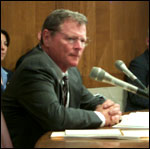
Jeffords speaking his mind.
Photo: U.S. Senate.
Asserting that he was confronting “truly life-and-death matters,” Sen. Jim Jeffords (I-Vt.) announced last week that as ranking member of the Senate Committee on the Environment and Public Works he would exercise his powers to put a hold on four high-level appointments to the U.S. EPA.
“I’m sorry it has come to this sad state, but I believe I am left with no other recourse,” he proclaimed dramatically in a statement to the committee.
It wasn’t the appointments he believed posed mortal dangers — in fact, Jeffords had just voted in favor of sending the nominations to the full Senate. Rather, the Vermont senator was taking the nominees hostage in order to exact a ransom from the EPA in the form of documents he has requested but not received over the last three years about the agency’s controversial policies.
Between May 2001, when Jeffords defected from the GOP, and January 2004, he made 12 formal requests for documents from the EPA on issues ranging from President Bush’s much-criticized mercury proposal to global-warming research to rollbacks of new source review regulations under the Clean Air Act.
Jeffords believes the documents will help paint a more complete picture of what went on within the administration in the lead-up to significant environmental policy changes — in particular, changes on mercury and new source review. And he believes the files could be fodder for people fighting those changes. “We think these documents could result in better protections for public health than the rules provide now,” said Chris Miller, a minority staffer at the EPW Committee.
Until now, Jeffords’ requests have been mostly or totally ignored by the EPA. “I am afraid this is yet another example of how the Bush administration acts in secrecy,” Jeffords told the committee. “I have bent over backwards to try to accommodate the EPA, but my patience is now worn out.”

Inhofe takes no guff.
Photo: U.S. Senate.
So cold has the EPA’s shoulder been, in fact, that the EPW Committee Chair, Sen. James Inhofe (R-Okla.) — a man who once compared the EPA to the Gestapo — has not only refrained from criticizing Jeffords for playing hardball but has supported him. In a March 4 letter to EPA Administrator Mike Leavitt, Inhofe joined Jeffords in asking that the EPA comply with Jeffords’ requests, noting that “the agency is obligated to respond to requests from each the chair [sic] and ranking member.”
Though on previous occasions Jeffords has made and withdrawn threats to interrupt Senate business in order to extract his requested documents (he threatened to filibuster Leavitt’s own nomination, for example), word is that this time he means business.
“Jeffords’ hold is firm,” said Miller. “We fully expect to get everything that we have requested.”
The EPA seems to recognize that this is not a boy-who-cried-wolf scenario. Spokesperson Cynthia Bergman insists that the agency is taking Jeffords’ request seriously: “We’re doing everything we can to review his request and get the problem resolved swiftly,” she told Muckraker.
Jeffords has no particular objections to any of the nominees, said Miller.
But one of the four nominees-in-waiting, Ann Klee, in line to serve as general counsel to Leavitt, has particularly rankled enviros.
Klee formerly served as a senior advisor to Sen. Dirk Kempthorne (R-Idaho), chair of the EPW’s Drinking Water, Fisheries, and Wildlife Subcommittee, with whom she worked on efforts to significantly rewrite the Endangered Species Act — much to the dismay of the environmental community. In 1997, she joined the majority staff of the EPW Committee and eventually rose to become its chief counsel.
But enviro’s strongest objections to Klee’s work stem from her three years as general counsel to Department of Interior Secretary Gale Norton.
Klee’s been charged with editing out critical scientific data from DOI reports on the environmental impacts of drilling in the Arctic National Wildlife Refuge.
Also, according to Sharon Buccino, a senior attorney at the Natural Resources Defense Council, Klee was one of the top DOI staffers involved in Vice President Dick Cheney‘s energy task force, and was among the select participants in clandestine meetings between White House and administration officials and energy-industry representatives. NRDC sought evidence of such meetings under the Freedom of Information Act and obtained calendar records [PDF] from Klee showing that she had a number of meetings with energy-industry executives and lobbyists, and comparatively few with members of the environmental community.
“Ann Klee is one of the key decision-makers within the department on energy issues. The meetings [on her calendar] reflect an agenda for promoting a single use of the land — energy development,” said Buccino.
Former colleagues, in contrast, have high praise for Klee. “My impression was that Klee is a very capable lawyer,” said Jo-Ellen Darcy, who worked with her as an EPW Committee staffer.
“Ann Klee was an outstanding leader at the Department of the Interior,” DOI Assistant Secretary Lynn Scarlett told Muckraker. “Her knowledge of the Endangered Species Act, among many other issues, is unparalleled.”
But given environmentalists’ vehement objections to DOI’s recent efforts related to endangered species and other environmental matters, it’s safe to say that Klee is not on the green team. She seems likely to go with the flow at the Bush EPA.
So as far as enviros are concerned, Klee is better off in bureaucratic limbo than in the agency charged with protecting the nation’s environmental health. The Jeffords case may be the first in which EPA intransigence proves to be a boon to environmentalists.

